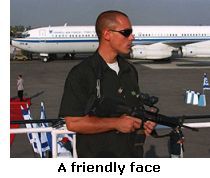 The Economist’s website features a Cities Guide focusing on major international cities. Monthly news on each city includes briefs on generally non-controversial issues of cultural or politically benign events and municipal happenings. That is, until you see February’s entry for Tel Aviv.
The Economist’s website features a Cities Guide focusing on major international cities. Monthly news on each city includes briefs on generally non-controversial issues of cultural or politically benign events and municipal happenings. That is, until you see February’s entry for Tel Aviv.
The lead news brief states that Israel’s Ben-Gurion Airport “is facing criticism over its alleged mistreatment of Arab passengers. A report by the Arab Association for Human Rights and the Centre Against Racism has accused airport staff of discriminating against Arabs.” The article is accompanied by a somewhat cynically captioned photo of an Israeli security guard at the airport.
The issue of profiling at airports is certainly not unique to Israel, having caused debate in other countries such as the US and UK. Does The Economist not appreciate that the necessary and stringent security measures at Ben-Gurion have ensured the airport’s status as the safest in the world? Why does the magazine choose to feature this story at all, particularly when one of the sources – the Arab Association for Human Rights – has been documented by NGO Monitor as a politicized organization that regularly uses inflammatory language to vilify Israel?
Not content with this negative portrayal of Tel Aviv and Israel (in contrast with other world cities), The Economist continues with a story that “Jewish religious leaders in Bnei Brak, an ultra-Orthodox Tel Aviv suburb, circulated a document in late December forbidding Jews from leasing property to Arabs.” Interestingly, as in the airport case, the Centre Against Racism also appears as a source for this story. Is The Economist only relying on single and one-sided sources for its information?
The debate and criticism relating to this story is absolutely legitimate (see YNet’s coverage for more detail) and took place within Israel itself. We do, however, wonder why The Economist chose to feature this controversial story some two months after it was first reported, not only in contrast with its other more benign city reports but also in sharp contrast to the reality of Tel Aviv as one of the most cosmopolitan cities in the entire Mideast.
Please ask The Economist why it has singled out Tel Aviv for negative and politicized reportage in comparison to other featured cities. Send your comments on the Cities Guide to The Economist – [email protected]
PHOTO STORE FINED FOR DISCRIMINATION
A California camera store refused to enlarge a dozen photographs from the turn of the century of Mitchell Cutler’s relatives in Eastern Europe and pre-state Israel because the store owner assumed that the photos’ subjects were “Jewish terrorists”.
Cutler pursued this case in court as a matter of principle, winning $4000 in addition to his attorneys fees. We are extremely grateful to former HonestReporting Mission participant Mitchell Cutler for pledging his $4000 to HonestReporting to enable us to continue our work to ensure Israel is accurately depicted in the media.
SPANISH REMINDER
Remember – Text-only Spanish translations of our communiques are available. Send an e-mail (in English please!) to [email protected] if you would like to take advantage of this service.

